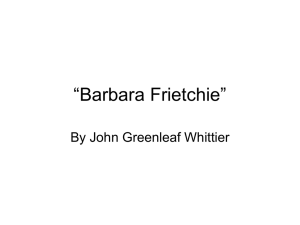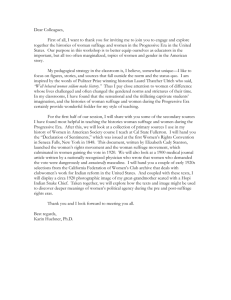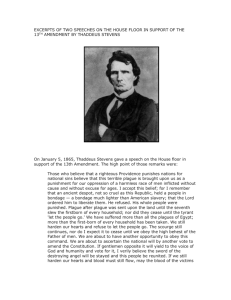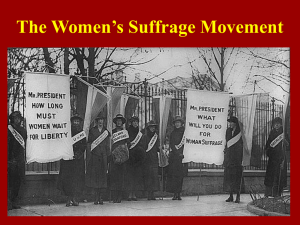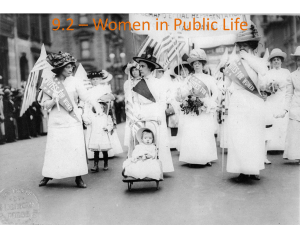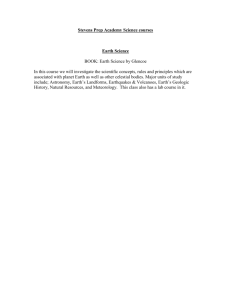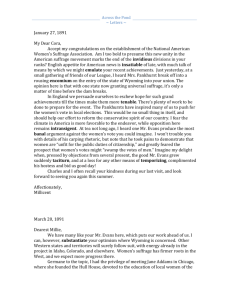Thaddeus Stevens, Black Suffrage and Land Redistribution (1867)
advertisement
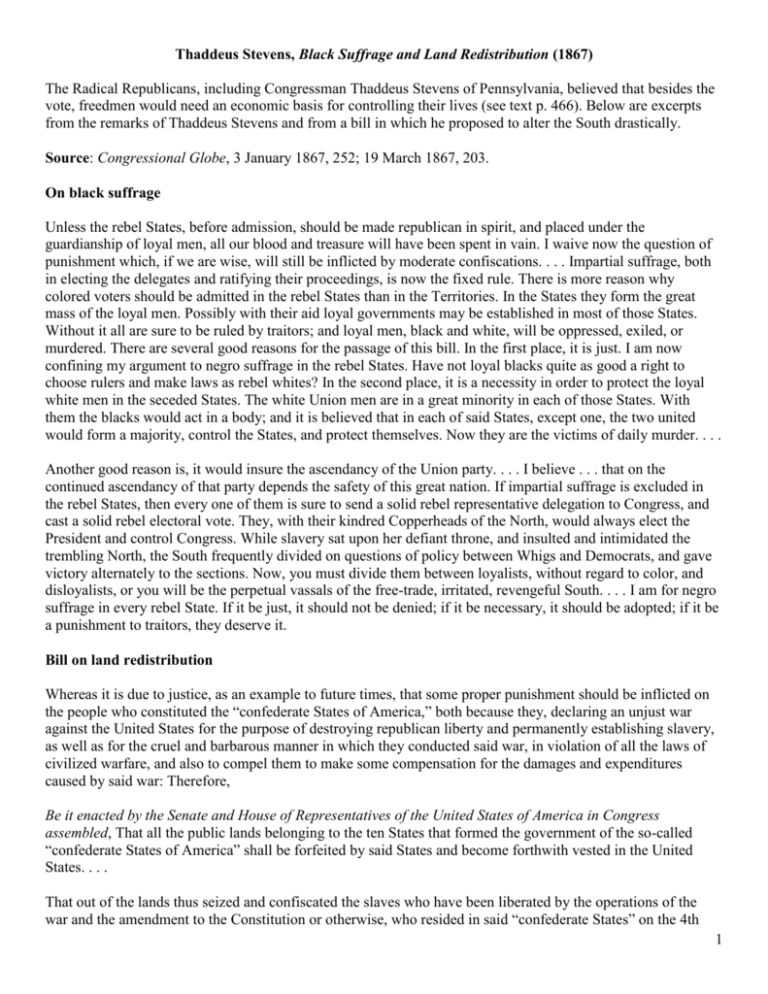
Thaddeus Stevens, Black Suffrage and Land Redistribution (1867) The Radical Republicans, including Congressman Thaddeus Stevens of Pennsylvania, believed that besides the vote, freedmen would need an economic basis for controlling their lives (see text p. 466). Below are excerpts from the remarks of Thaddeus Stevens and from a bill in which he proposed to alter the South drastically. Source: Congressional Globe, 3 January 1867, 252; 19 March 1867, 203. On black suffrage Unless the rebel States, before admission, should be made republican in spirit, and placed under the guardianship of loyal men, all our blood and treasure will have been spent in vain. I waive now the question of punishment which, if we are wise, will still be inflicted by moderate confiscations. . . . Impartial suffrage, both in electing the delegates and ratifying their proceedings, is now the fixed rule. There is more reason why colored voters should be admitted in the rebel States than in the Territories. In the States they form the great mass of the loyal men. Possibly with their aid loyal governments may be established in most of those States. Without it all are sure to be ruled by traitors; and loyal men, black and white, will be oppressed, exiled, or murdered. There are several good reasons for the passage of this bill. In the first place, it is just. I am now confining my argument to negro suffrage in the rebel States. Have not loyal blacks quite as good a right to choose rulers and make laws as rebel whites? In the second place, it is a necessity in order to protect the loyal white men in the seceded States. The white Union men are in a great minority in each of those States. With them the blacks would act in a body; and it is believed that in each of said States, except one, the two united would form a majority, control the States, and protect themselves. Now they are the victims of daily murder. . . . Another good reason is, it would insure the ascendancy of the Union party. . . . I believe . . . that on the continued ascendancy of that party depends the safety of this great nation. If impartial suffrage is excluded in the rebel States, then every one of them is sure to send a solid rebel representative delegation to Congress, and cast a solid rebel electoral vote. They, with their kindred Copperheads of the North, would always elect the President and control Congress. While slavery sat upon her defiant throne, and insulted and intimidated the trembling North, the South frequently divided on questions of policy between Whigs and Democrats, and gave victory alternately to the sections. Now, you must divide them between loyalists, without regard to color, and disloyalists, or you will be the perpetual vassals of the free-trade, irritated, revengeful South. . . . I am for negro suffrage in every rebel State. If it be just, it should not be denied; if it be necessary, it should be adopted; if it be a punishment to traitors, they deserve it. Bill on land redistribution Whereas it is due to justice, as an example to future times, that some proper punishment should be inflicted on the people who constituted the “confederate States of America,” both because they, declaring an unjust war against the United States for the purpose of destroying republican liberty and permanently establishing slavery, as well as for the cruel and barbarous manner in which they conducted said war, in violation of all the laws of civilized warfare, and also to compel them to make some compensation for the damages and expenditures caused by said war: Therefore, Be it enacted by the Senate and House of Representatives of the United States of America in Congress assembled, That all the public lands belonging to the ten States that formed the government of the so-called “confederate States of America” shall be forfeited by said States and become forthwith vested in the United States. . . . That out of the lands thus seized and confiscated the slaves who have been liberated by the operations of the war and the amendment to the Constitution or otherwise, who resided in said “confederate States” on the 4th 1 Thaddeus Stevens, Black Suffrage and Land Redistribution (1867) day of March, a.d. 1861, or since, shall have distributed to them as follows, namely: to each male person who is the head of a family, forty acres; to each adult male, whether the head of a family or not, forty acres; to each widow who is the head of a family, forty acres—to be held by them in fee-simple, but to be inalienable for the next ten years after they become seized thereof. . . . That out of the balance of the property thus seized and confiscated there shall be raised, in the manner hereinafter provided, a sum equal to fifty dollars, for each homestead, to be applied by the trustees hereinafter mentioned toward the erection of buildings on the said homesteads for the use of said slaves; and the further sum of $500,000,000, which shall be appropriated as follows, to wit: $200,000,000 shall be invested in United States six per cent securities; and the interest thereof shall be semi-annually added to the pensions allowed by law to pensioners who have become so by reason of the late war; $300,000,000, or so much thereof as may be needed, shall be appropriated to pay damages done to loyal citizens by the civil or military operations of the government lately called the “confederate States of America.” . . . That in order that just discrimination may be made, the property of no one shall be seized whose whole estate on the 4th day of March, a.d. 1865, was not worth more than $5,000, to be valued by the said commission, unless he shall have voluntarily become an officer or employee in the military or civil service of the “confederate States of America,” or in the civil or military service of some one of said States. Document questions: Answer the following questions for discussion in class on the day specified by the syllabus. Be sure to note where the information to answer the question is located in the document (i.e., Highlighting or notes in the margin) but, DO NOT copy and paste parts of the document for your answer. (This is plagiarism) Answer the questions in your own words. You may hand write or word process your answers. 1. What type of document is this? (Primary/Secondary and what IS it?) ________________________________ __________________________________________________________________________________________ __________________________________________________________________________________________ 2. What is the bias of this Author, as it relates to this topic? What might account for this bias? __________________________________________________________________________________________ __________________________________________________________________________________________ __________________________________________________________________________________________ 3. On what grounds did Stevens justify granting African American men the vote? __________________________________________________________________________________________ __________________________________________________________________________________________ __________________________________________________________________________________________ 2 Thaddeus Stevens, Black Suffrage and Land Redistribution (1867) 4. What did Stevens want to do with land confiscated in the South? __________________________________________________________________________________________ __________________________________________________________________________________________ __________________________________________________________________________________________ 5. Why do you think Congress rejected Stevens's land confiscation and redistribution proposal? __________________________________________________________________________________________ __________________________________________________________________________________________ __________________________________________________________________________________________ 6. Do you think that if Congress had adopted the proposal, it would have made a difference in the history of the South or the United States? Why or why not? __________________________________________________________________________________________ __________________________________________________________________________________________ __________________________________________________________________________________________ __________________________________________________________________________________________ __________________________________________________________________________________________ __________________________________________________________________________________________ 3
